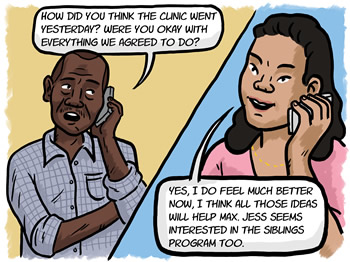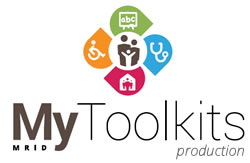Keeping communication open after a SchoolKit Clinic is key to the clinic’s success. This means the health team may talk with the school and with the child’s family after the clinic, to ensure that agreed strategies and actions are followed through.

Immediately after a clinic it is often valuable for one member of the health team to contact the family – perhaps by phone – and ‘debrief’.
In this conversation it is important to confirm what the family understood to be the key take-home messages from the day, and ensure that they were consistent with what the health team and other professionals involved understood them to be. This is particularly valuable for families who are new to the clinic process. Major advances and breakthroughs can also be reiterated and positive outcomes celebrated in this conversation.
Likewise, additional support can be offered to the family to reinforce what was decided during the clinic. It may be useful to ask questions such as:
‘When you got home and discussed the clinic, were you asked any questions by your family? Were there any that you couldn’t answer?’ or ‘Did you think of anything later that you forgot to ask, or thought of later?’.
Of course, where there has been significant distress experienced by the family during the clinic, the health team should do all they can to provide appropriate follow-up support and information.
Circulating the Management Plan
The details of the clinic are written up (often by a registrar, or trainee medical consultant). This summary will include details of what new information has been brought to light, aims and objectives, what changes to existing strategies will be trialled and what new strategies will be implemented. Together, this information forms the new management or care plan that everyone has agreed will serve to best meet the needs of the child and their family.
An outline of the management plan is collated into a letter that is addressed, and sent to, the family.
Copies of the letter will often also be sent to the school, and other specialists who participated in the clinic. It may also be copied to additional specialists and agencies already involved in supporting the family and those whose involvement is being sought for the first time. This may include service providers, such as a disability support service or a respite service. Exactly who the letter may go to is guided by the parent or carer and the consents they have given for this sensitive information to be shared.
In this way, everyone involved in the clinic can be confident that details of plans, hoped for outcomes and medication details have been consistently understood and that everyone who needs to know about them does.
Ongoing Follow-up
It may be necessary for a member of the health team to follow-up with the family to find out the results of new tests (for example, blood tests) and take whatever action may be necessary as a consequence. There may also be a need for the health team to make referrals or applications to other medical specialists, allied health service providers, or disability service organisations and agencies.
Where it has been decided that a family will themselves approach new service providers, letters from the health team helping to advocate for them are also often valuable.
It is essential that the health team acts on any commitments that they have made during the clinic and follow them through to their natural conclusion. Trialling new medications, for example, may take a considerable period of time and involve repeat contacts with the family, and perhaps the school, as the effect of the changes becomes known, doses are adjusted, or alternative medications are trialled.
The health team will continue contact until the child’s health and wellbeing has stabilised to everyone’s satisfaction and all issues around the medication have been resolved.
The health team will also remain in ongoing contact with a family or their child’s school, by phone or email, to assess the efficacy of strategies implemented by others – the school, other specialists, service providers, and the family themselves. Such contact may continue as long as necessary.
Follow-up clinic appointments may need to be booked immediately or whenever required.




